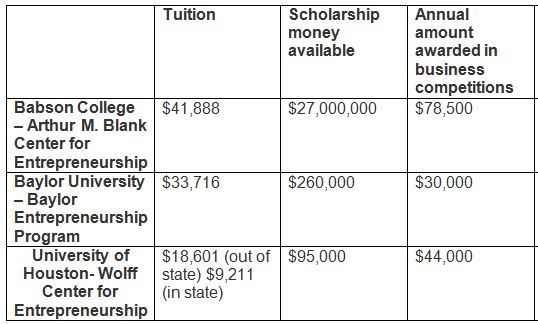
Are you considering getting a degree in entrepreneurship? Over the past decade, colleges and universities have been offering specializations in entrepreneurship, diverging from the traditional business degrees. But is it worth it?
It’s a common dilemma. How much will it cost? Will it be worth the investment? And what sets a degree in entrepreneurship apart from a standard business degree or MBA?
Deciphering whether an entrepreneurship degree is the right choice for you can be a challenging task. But fear not, as we’ve done the research, talked to experts, and gathered valuable insights to help you make an informed decision.
Ultimately, the choice is yours. We’re here to provide you with information to guide you through this decision-making process.
The Difference Between a Degree in Entrepreneurship and a Degree in Business
While some argue that entrepreneurship and business degrees are synonymous, the reality is quite different. As per the Harvard Business Review, there exists a significant distinction.
An MBA or standard business degree emphasizes “causal” reasoning, focusing on business plans, ROI calculations, and quick revenue generation. On the other hand, an entrepreneurship degree prioritizes “effectual” reasoning, allowing goals to evolve organically through tactics like experimental marketing and bootstrapping.
Many programs integrate traditional business teachings with innovation and entrepreneurship, offering specialized tracks in entrepreneurship within MBA programs. The key is to carefully select a program that aligns with your goals and aspirations.
Try Grasshopper
- Get a local or toll-free number, call forwarding, voicemails transcribed, unlimited extensions, and more!
- Plans starting at $12/month
Where Are You Coming From?
Understanding your background is crucial in determining the most suitable educational path. Whether you’re a prospective undergraduate or a working professional seeking advanced education, your starting point matters.
If you’re already in college, pursuing an undergraduate degree in entrepreneurship may be a natural progression. However, if you’re contemplating an MBA or postgraduate studies, your decision carries more weight.
Consider your motivations, financial circumstances, and career objectives before committing to a program. Clarifying these aspects beforehand can help you make a well-informed choice.
How Much Does a Degree in Entrepreneurship Cost?
Entrepreneurship programs come in various formats, ranging from undergraduate degrees to specialized MBAs. While education undoubtedly incurs costs, there are options to mitigate expenses, such as in-state tuition rates and scholarships.
We’ve compiled the costs of the top undergraduate and graduate entrepreneurship programs to provide transparency on the financial aspect.
Cost of Top 3 Undergraduate Entrepreneurship Programs

Source: Entrepreneur’s 2013 Top 25 Undergraduate Colleges
Cost of Top 3 Graduate Entrepreneurship Programs

Source: Entrepreneur’s 2013 Top 25 Graduate Universities
Is an Entrepreneurship Degree Worth It?
One might question the value of an entrepreneurship degree, especially when iconic figures like Mark Zuckerberg achieved success without formal education. To address this query, we sought insights from entrepreneurs with entrepreneurship degrees.
You Have to Want It
Passion is paramount in the field of entrepreneurship. Pursuing a degree solely for monetary gain may not align with the essence of entrepreneurship. It’s essential to view entrepreneurship as a platform for serving others and working diligently towards your goals.
“Make sure you pursue entrepreneurship for the right reasons. I’ve seen some students pursue entrepreneurship because they think it sounds cool or will lead to riches,” says Dan Price, CEO of Gravity Payments. “Instead, look at entrepreneurship as an opportunity to serve and work hard.”
Getting Tools and Blueprints
Education equips aspiring entrepreneurs with essential knowledge and skills needed to navigate the complexities of starting a business. Entrepreneurs attest to the value they derived from their academic programs, emphasizing the practical insights gained.
“Learn all you can before, during, and after classes,” advises Mila Golovine, founder and President of MasterWord Services. “Seeking the same advice later can cost you thousands of dollars per hour in consulting fees.”
Why rely on external consultants when you can acquire the necessary expertise through education? From crafting business plans to managing operations, entrepreneurship programs offer a comprehensive toolkit for aspiring entrepreneurs.
The Necessity of Networking
Networking plays a pivotal role in an entrepreneur’s journey. The connections forged during academic pursuits often evolve into long-lasting collaborative relationships, providing a strong support system during challenging times.
“The connections I made were priceless,” shares Golovine. “I remain in touch with industry veterans, enabling me to leverage their insights when needed.”
Emphasizing the importance of networking, entrepreneurs highlight the enduring value of cultivating relationships within the entrepreneurial ecosystem.
Take the Advice You Get
Entrepreneurship education isn’t just about acquiring knowledge—it’s about applying that knowledge in real-world scenarios. Entrepreneurs stress the significance of heeding advice from experienced professionals to avoid common pitfalls.
“I wish I had listened to everything we were told not to do,” reflects Golovine. “I could have avoided many mistakes by following the advice of those who had walked the path before me.”
Learning from the experiences of others and implementing sound advice can significantly impact the success of entrepreneurial endeavors.
Learn to Talk Business
Earning a degree in entrepreneurship not only enhances your business acumen but also hones your communication skills. Effective communication is essential for networking, pitching ideas, and fostering collaborations within the entrepreneurial sphere.
“Prior to tapping into [my program’s] resources, I really did not talk about my business a lot. Entering the competition and attending events forced me to articulate my ideas confidently,” shares Dan Price.
Learn What You Don’t Know
An entrepreneurship degree serves as a structured platform to acquire knowledge in diverse areas, from finance to marketing. It exposes aspiring entrepreneurs to a spectrum of disciplines, fostering a holistic understanding of business operations.
“I had a lot to learn, having never delved into accounting, finance, or marketing before,” acknowledges Lesley Stracks Mullem, co-founder of Taste Carolina. “The program helped me acquire essential skills and knowledge that proved invaluable in my entrepreneurial journey.”
What Can I Do With a Degree in Entrepreneurship? What Jobs Can I Get?
While the specific outcomes of an entrepreneurship degree may vary, it opens doors to diverse career paths. Employers across industries value the skill set acquired through entrepreneurship education, making graduates desirable candidates for startups, consulting firms, and entrepreneurial ventures.
Do Entrepreneurs Recommend It?
Entrepreneurship degree holders generally express satisfaction with their educational journey, citing the invaluable experiences and skill development gained. However, success in entrepreneurship is not solely determined by a degree; it is a culmination of attitude, skills, and perseverance.
Ultimately, the decision to pursue an entrepreneurship degree hinges on your unique circumstances and career aspirations. While education can undoubtedly provide a strong foundation, belief in your abilities and a zeal for entrepreneurship are equally crucial.
For more insights and perspectives on this debate, check out discussions on Quora.
Additional Resources


